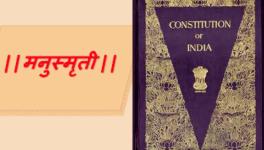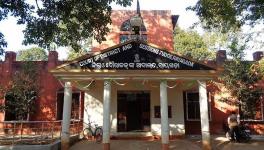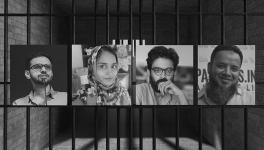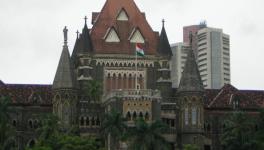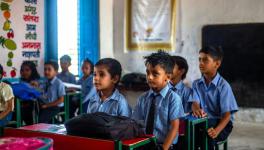Shaheen Bagh: Thousands Say in One Voice – Nothing Less Than CAA Roll-Back
New Delhi: A sea of people poured in at Shaheen Bagh on January 12 evening to extend solidarity to protesting women, who have been staging a ‘dharna’ (sit-in) at Kalindi Kunj-Noida highway for the past 28 days – protesting against the controversial Citizenship (Amendment) Act, 2019, the National Population Register (NPR) and the proposed National Register of Indian Citizens (NRIC).
The huge turnout on Sunday at ‘Shaheen Square’ – as they call the protest site – came in the backdrop of a protest led by Bharatiya Janata Party (BJP demanding eviction of protesters from the arterial road and also raising violent slogans, such as ‘Desh Ke Ghaddaron Ko, Goli Maaro Saalon Ko’ (shoot the traitors).
A day earlier, a few people had blocked the highway near Sarita Vihar and reportedly attacked several vehicles, asking the police to forcefully evict the Shaheen Bagh protestors. Two of them were later taken into custodyand sent to jail.
On Sunday, apart from the usual chanting of ‘azadi’ slogans, the demonstrators came up with a very artistic way of registering their protest. A replica of India Gate has come up in a corner with names of people who lost their lives during the anti-CAA protests across the country.
An iron grilled ‘detention camp’ is another centre of attraction, with men, women and children getting inside and getting clicked.
Different graffiti and interesting posters adorn the protest site. A group of protestors were seen making the country’s map with iron rods on one of the carriage ways.
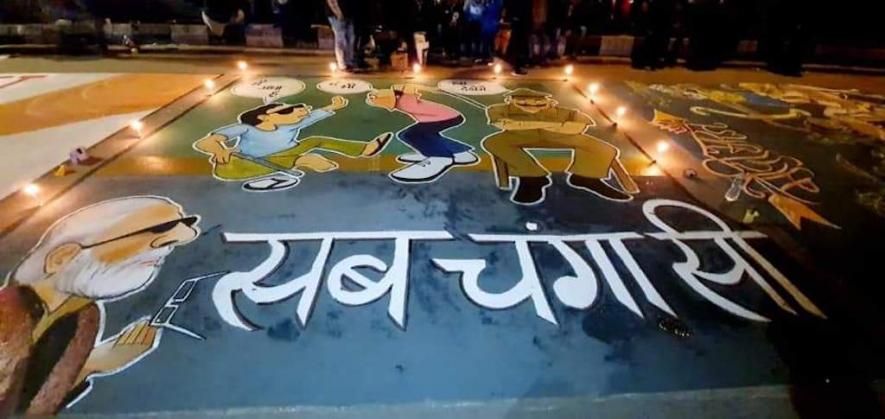
“We are shaheens (eagles) of Shaheen Bagh. This is a do or die fight. And that’s why we are here for the past 28 days, caring a damn about the harsh weather. We have a one-point demand – withdraw the contentious legislation and the notified NPA. Otherwise, we will not leave the place,” a mother of two young children told Newsclick.
Responding to government rhetoric that protestors across the country were being ‘misled’ about CAA by Opposition parties, another protester, in her early 30s, said the government must stop considering the electorate as “illiterate”. “We are people who think. We cannot be misguided. We have read the new law, which has now been notified. It is discriminatory and unconstitutional. Don’t think that all those who are out on the streets are ignorant like you (the government),” she said in anger.
On the blockade of the road, which is used by office goers and commercial purposes, resulting in inconvenience to many, an elderly protester said: “It is a fight for them as well. They are not realising that a big problem is waiting for them. They, too, will have to pass the citizenship test. They will also have to stand in queues. We also don’t want to sit in the open in this cold weather. We have our family commitments. But we are here because there is a threat to the integrity of the country. There is a threat to the existence of every citizen. Therefore, you need to sacrifice your comforts for a larger cause,” she added.
With regard to counter protests and polarisation, several proetsters said if something unwanted happens, the ruling party at the Centre and the city police (under Home Ministry) would be held accountable. “We are registering our protests peacefully and in a democratic manner. We won’t tolerate it being given any communal colour. Any attempt of this sort will lead to deterioration of law and order situation,” they said.
Several protestors this correspondent spoke to said they were left with no option but to hit the streets as it was a fight of their “existence”. “The good days are over. It’s an existential crisis. The NPR is the first step towards NRIC. Everyone who is not able to make it to the proposed citizenry roll, will be given back Indian citizenship through CAA as it will be implemented in retrospective,” he added.
Three elderly women – popular as ‘Dabang Dadis’ of Shaheen Bagh after they appeared on a national TV news channel – too have been a constant sight at the centre stage of the protest venue since day one.
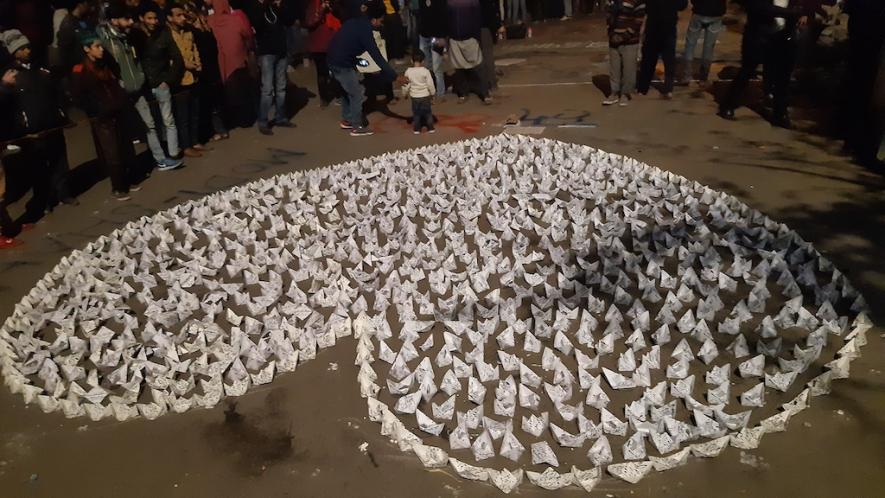
Explaining the technical aspect of the new citizenship law, Advocate Oliullah Laskar, a lawyer at Gauhati High Court, said paragraph 7 of the statement of objects and reasons of CAA states that many persons of Indian origin, including persons belonging to the said minority communities (Hindu, Sikh, Buddhist, Jain, Parsi and Christian) from the countries mentioned in the legislation (Afghanistan, Pakistan and Bangladesh) have been applying for citizenship under Section 5 of the Citizenship Act, 1955, but they are unable to produce proof of their Indian origin.
Hence, they are forced to apply for citizenship by naturalisation under Section 6 of the said Act, which, inter alia, prescribes 12-year residency as a qualification for naturalization, in terms of the Third Schedule to the Act.
“Statement of objects and reasons is not part of the law. But they give pointers helpful in understanding and interpreting the law. Points to be noted here are that (1) the applicants for registration under Section 5 of the Citizenship Act, 1955 are required to prove their Indian origin, which means they have to prove that they or either of their parents were born in undivided India or in territory that became part of India after independence. (2) Many people fail to fulfil this requirement.
“Admittedly, for this reason, CAA enables them to make applications either under Section 5 for registration or under Section 6 for naturalisation and the requirement of residing in India for 12 years (11years+12 months) under Third Schedule is reduced for them to 6 years (5+1).
“Now, this is applicable to only those people who are exempted from the definition of illegal migrant by the proviso to Clause (b) of Subsection (1) of Section 2. They are persons belonging to Hindu, Sikh, Buddhist, Jain, Parsi or Christian communities from Afghanistan, Pakistan or Bangladesh.
“In other words, to be exempted from the requirement of proving that they are of Indian origin and to avail the benefit of amendment to Third Schedule, they are required to prove that they are from Afghanistan, Pakistan or Bangladesh. More simply put, to avoid the difficulty of proving that they are from Pakistan or Bangladesh, they have to prove that they are from Afghanistan, Pakistan or Bangladesh,” he explained.
UNITY IN DIVERSITY
On Sunday, people belonging to different faiths came together at Shaheen Bagh to take part in ‘Sarv Dharma Samvad’ (equal respect for all religions or peaceful co-existence of all religions). The inter-faith ceremony was organised with traditional ‘hawan’ performed by a Hindu priest, Quran recitation by local Muslims, Sikh ‘kirtans’ and Bible recitation.
Later, they all read out the Preamble of the Constitution and pledged to preserve India’s “socialist and secular” values.
‘Sarva Dharma Samvad’ was popularised by Mahatma Gandhi during India’s freedom struggle against British rule to promote inter-faith harmony.
‘READ FOR REVOLUTION’
A makeshift library in a corner of the protest site is one of the major attractions where children, men and women can be seen engaged in designing posters and reading books. It has been organised by a group of Jamia students.
“The aim to set up this makeshift library is to educate people. We encourage children to sit and study and know about the Constitution and its preamble. Don’t just come to raise slogans, come here and study so that you can be an informed citizen. One must know about the fight he or she is fighting,” said Vasundhara, a student of Jamia Millia Islamia.
Astha, a student of National Law University, who had come to Shaheen Bagh for the first time, shared her experience in a Muslim ghetto. “People are very cordial here. There are small children and hijab clad women. It is breaking all sterotypes regarding Muslim women. They are out on streets demanding for their rights and fighting back the government’s decision to impose an unconstitutional law. I am really inspired. I have come here to extend my solidary, respect and salute to the brave women,” she added.
Showing a placard, a girl studying in standard three, said she was drawing the national flag. “This is the symbol of unity and integrity. Unfortunately, this very flag is under attack these days. I urge Prime Minister Narendra Modi to withdraw the black law his government has enacted. We are Muslims, it is our identity. But we are equal citizens of the country guaranteed by our beloved Constitution,” she said.
Get the latest reports & analysis with people's perspective on Protests, movements & deep analytical videos, discussions of the current affairs in your Telegram app. Subscribe to NewsClick's Telegram channel & get Real-Time updates on stories, as they get published on our website.










